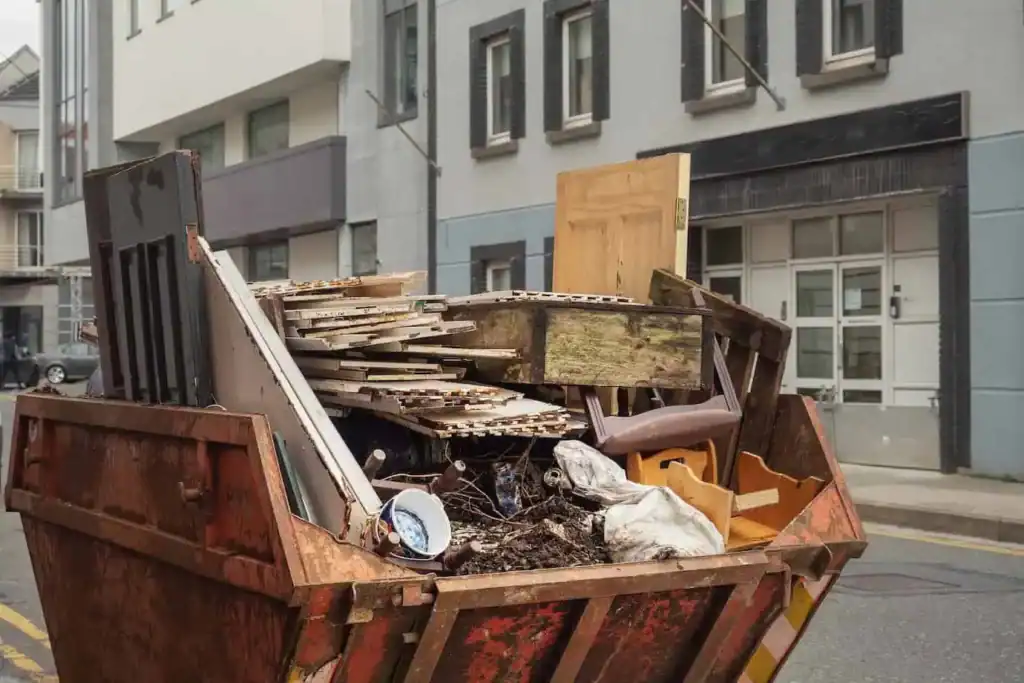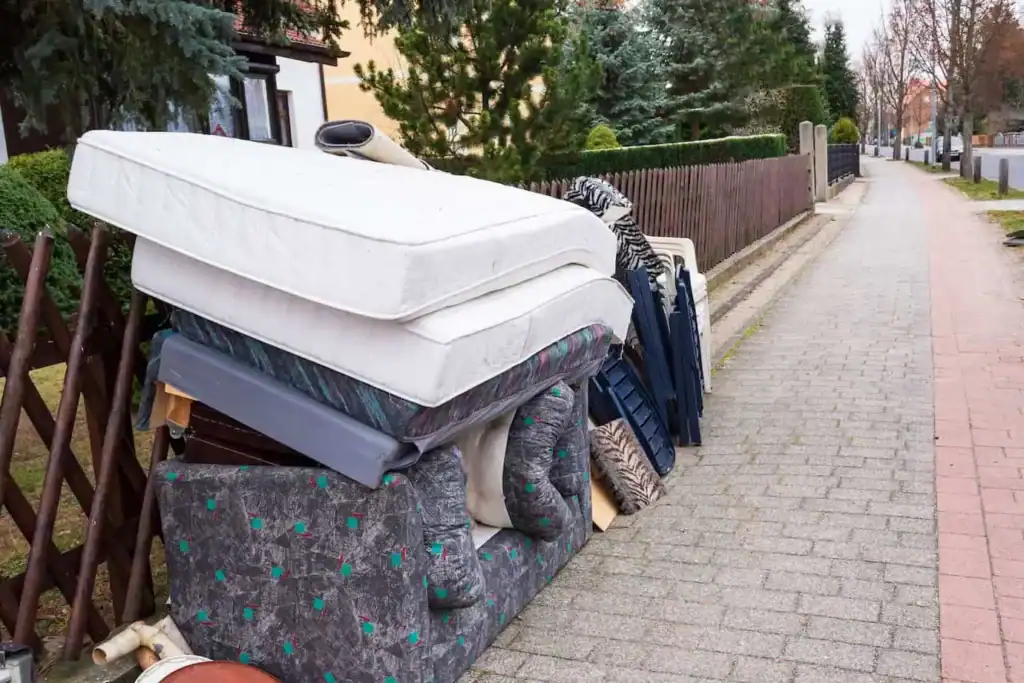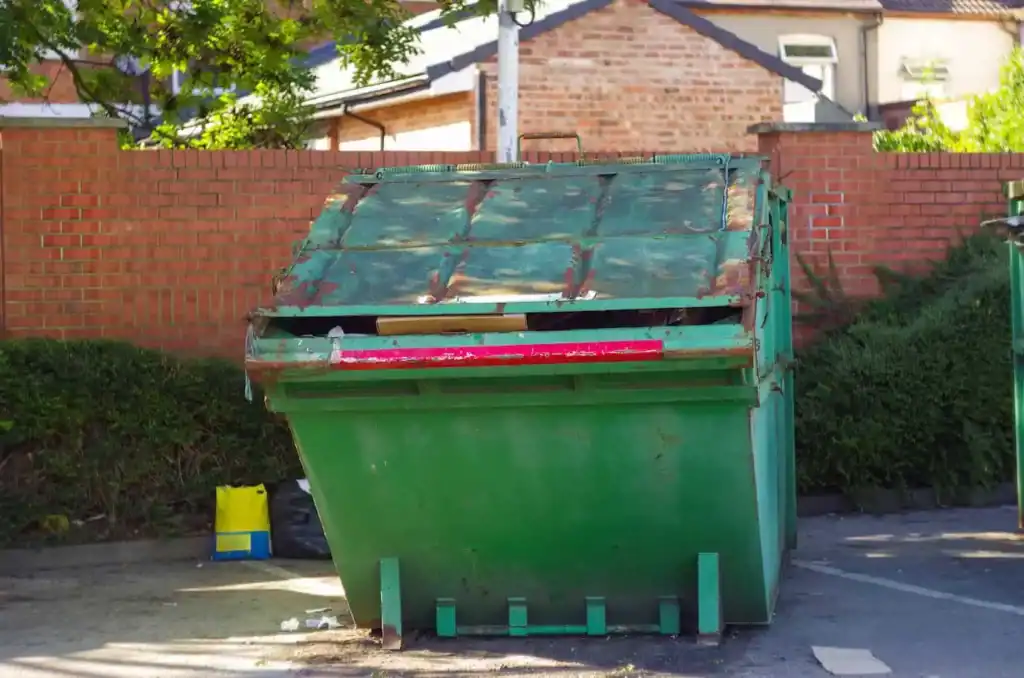How much does junk removal cost? The answer depends on how much junk you’re tossing, what items you need removed, and where you’re located. People book junk removal for various reasons, such as clearing a house before a move, decluttering before downsizing, wrapping up a remodel, or settling an estate. When regular trash pickup won’t cut it, hauling services step in.
Costs vary by region, junk type, and job complexity, but understanding average pricing and how junk haulers calculate their rates can help you plan ahead and avoid surprise charges.
Fast facts about junk removal in 2025 based on industry estimates:
- The waste collection industry in the United States is massive — expected to hit $86.1 billion in revenue in 2025 alone.
- There are over 21,000 junk haulers nationwide, ranging from big-name franchises to hard-working locals.
- Most people pay somewhere between $150 and $350 for junk removal, depending on the load.
- Single-item pickups (like a mattress or appliance) can run as low as $75, while full-house cleanouts and bulky jobs can top $800.
- Most junk removal companies charge by truck space, not weight — think $100 to $130 for an eighth of a truck, or up to $850 for a full 13-17 cubic yard load.
- Spring and early summer are the busiest times for junk removal. If you can, book midweek or off-season to keep your price down and your options open.
In this guide, you’ll learn how companies typically charge for junk removal, how much they charge, factors that affect costs, and money-saving tips. All figures are averages based on many data sources, including quotes from junk removal companies.
How Is Junk Removal Charged?
Most junk removal companies base their pricing on how much space your stuff takes up in the truck — not how much it weighs. You’ll usually see volume-based quotes broken down into chunks of the truck:
- ⅛ load
- ¼ load
- ½ load
- ¾ load
- Full truckload
Some providers offer flat rates for single items (such as a mattress or fridge), while others charge hourly. If your junk fills a good portion of a truck, volume-based pricing almost always gives you the best value.
On the other hand, if you’re just getting rid of one or two things, you should ask about minimum load pricing. Many companies charge for at least 1/8 of a truck, even if your junk takes up less space than that.
Common types of junk removal include:
- Household clutter and furniture: Couches, mattresses, dressers, old shelving, and boxes
- Appliances and electronics: Refrigerators, AC units, washing machines, TVs, and computers
- Yard debris: Leaves, branches, stumps, and storm waste
- Construction waste: Wood, drywall, tile, shingles, and demolition scrap
- Hazardous materials: Paint, chemicals, tires, and freon appliances (these typically require extra handling)
- Miscellaneous junk: Anything too bulky or awkward for curbside pickup
If it’s possible for your type of removal, combining several items into a single pickup often makes sense for anyone paying a minimum trip fee rather than scheduling multiple smaller hauls.
Average Cost of Junk Removal in 2025

The national average cost for junk removal in 2025 is $210 to $250 per job based on industry estimates, but depending on your load size, service type, and location, costs can range from $75 to over $850.
Single-item jobs may still trigger a minimum service fee of around $100, even if the item takes up less than 1 cubic yard. Large-scale cleanouts that fill an entire truck can run $600 or more, particularly if heavy or hazardous items are involved.
Here’s a look at 2025 junk removal pricing by load size, based on industry estimates:
| Service | Cubic Yards of Junk | Estimated Cost |
| Single-item pickup (e.g., mattress) | Less than 1 cubic yard | $75-$150 |
| ⅛ Truckload | 2-3 cubic yards | $100-$130 |
| ¼ Truckload | 3-4.5 cubic yards | $150-$210 |
| ½ Truckload | 4.5-11 cubic yards | $250-$420 |
| ¾ Truckload | 11-13 cubic yards | $400-$625 |
| Full Truckload | 13-17 cubic yards | $650-$850 |
| Hourly labor (if applicable) | Varies by crew size | $50-$110 per hour/person |
Costs based on industry averages and quotes for various junk removal companies across the country.
How Much Do You Tip Junk Removal Workers?
Tipping junk removal workers isn’t required, but it’s appreciated. Most jobs are physically demanding, time-consuming, or involve tight spaces, and tipping is often the best way to say thank you. You might consider:
- 10%-20% of the total job cost
- $10-$20 per person for smaller jobs or quick pickups
- Snacks and drinks as another way to show appreciation
A friendly, efficient crew that treats your home with care deserves recognition. If you’re working with a limited budget, a genuine thank you and a positive review also go a long way. Looking for more details on tipping your movers? Follow this guide!
Factors That Affect Junk Removal Pricing
Junk removal quotes aren’t always apples-to-apples. The same truckload of debris might cost $100 more in one ZIP code than another — or jump in price if it includes a few specialty items. Here’s some of what influences the final price.
Volume of Junk
More volume = more cost. A job that fills a full 15-cubic-yard truckload will cost significantly more than a job that takes up just a corner of one. Still, the per-yard cost drops when you book larger loads, so combining items often delivers better value than multiple trips.
Type of Junk

Certain items cost more to haul due to handling and disposal requirements. These often include:
- Freon appliances
- Mattresses
- Electronics and batteries
- Paint, solvents, and other hazardous materials
- Construction debris (mixed loads of concrete, tiles, and insulation)
Metal items and donatable furniture may attract reduced fees if the hauler recycles or resells them.
Location and Accessibility
Hauling junk from a third-floor walk-up takes longer than grabbing it curbside. The same goes for hauling junk out of tight basements, attics, or behind fenced-in yards. Labor-intensive access increases time on site, which can increase pricing.
Location also influences local disposal fees. Cities with higher landfill charges usually have higher quotes, and pricing in high-cost-of-living metros follows the same trend.
Labor and Time Required
Most jobs include a standard amount of labor in the base rate (typically 1-2 movers and 30-60 minutes of loading). Expect additional labor charges if your job requires more hands, multiple trips, or disassembly.
Disposal and Recycling Costs
Some types of junk come with built-in fees at local landfills or recycling centers. For example:
- Electronics
- Tires
- Large appliances
- Paint cans and chemicals
- Yard waste by weight
Disposal pricing varies by city, but most junk haulers include these charges in their quotes, so ask if you’re unsure.
Average Cost of Junk Removal by Item Type
Looking to ditch just 1 or 2 large items? Depending on the service, you’ll often pay a flat removal fee or a minimum load price. Here’s a table showing average junk removal costs in 2025:
| Item | Typical Cost |
| Mattress or Box Spring | $75-$150 |
| Couch or Sectional | $100-$275 |
| Refrigerator or Appliance | $90-$200 |
| Yard Waste (small load) | $100-$225 |
| Construction Debris | $150-$900 |
| Hot Tub | $300-$700 |
| Piano (upright) | $200-$450 |
Do you have lightly used furniture? Donate it to save money (and do some good). Checking out 12 Charities Offering Furniture Donation Pickup for Free is a great place to start.
Labor and Disposal Removal Costs
Junk removal pricing typically includes basic labor and landfill fees, but certain items carry extra disposal charges due to local regulations or environmental handling requirements. These surcharges are usually tacked onto your quote.
Common specialty disposal fees include:
- Appliances with freon: $20-$50 per item for fridges, freezers, and AC units
- Tires: $7-$20 each for safe tire recycling
- Paint, solvents, or pool chemicals: $1-$5 per pound, depending on material
- Batteries or electronics: $0.10-$12 per pound, especially for older CRT TVs
- Fluorescent lightbulbs: $2-$5 per bulb due to mercury content
Some companies refuse to haul hazardous waste entirely, so ask first if your pile includes anything questionable.
Add-ons may include:
- Home cleanouts: $1,000 or more for whole-home junk removal with sorting and packing
- Donation drop-offs: Flat $50-$100 fee if you want items delivered to a specific charity
- Light demolition or yard clearing: Typically priced hourly or as a custom quote, usually between $50 and $100 per hour per worker
- Expedited pickup: May add 10%-25% to your quote
While most haulers bundle these charges into your final price, it’s worth asking how they break it down if you’re comparing quotes.
Dumpster Rental vs. Full-Service Junk Removal Costs

Some projects are better suited to a dumpster rental. This is especially true if you’re doing your own demo or need time to sort through any clutter. Other situations call for a full-service crew to make the junk vanish quickly. Here’s how they typically compare.
Dumpster Rental
Renting a roll-off dumpster gives you the freedom to load at your own pace. Most rentals include a 7-day window, drop-off and pickup, and a set weight limit. Pricing varies by size and city, but industry averages in 2025 look like this:
| Dumpster Size (Cubic Yards) | Typical Cost |
| 2 | $75–$200 |
| 4 | $125–$250 |
| 8 | $225–$325 |
| 10 | $275–$600 |
| 20 | $350–$750 |
| 30 | $425–$850 |
| 40 | $475–$950 |
Pros:
- Cost-effective for very large volumes
- Great for multi-day projects like remodeling or roofing
- No appointment needed — you load when ready
Cons:
- Requires space for drop-off
- You do all the heavy lifting
- May require a permit if it sits on the street
- Overfilling or overweight loads mean extra fees
- Can damage driveways or landscaping if not placed carefully
Full-Service Junk Removal
Hiring a crew means you don’t lift a thing. They size up the job, remove everything, and clean up — often in under 2 hours. It’s a streamlined option that works well for busy homeowners, seniors, or anyone facing a tight deadline.
Pros:
- Fast and hands-free
- Safer for large, heavy, or awkward items
- No need to estimate volume — your crew handles it on the spot
- Ideal for one-time cleanouts or tight schedules
Cons:
- May be more expensive than dumpster rental for large volumes
- Need to be on-site to direct your movers
- Can’t add more junk later
If you’re hauling construction debris daily, like during a renovation or whole-home cleanup, a dumpster may be worth it. But if you’re looking at a full garage or a cluttered basement, full-service is faster and safer.
National Chains vs. Local Junk Removal Companies
Should you go with a big-name crew or the local team everyone recommends? National chains and local haulers both get the job done, but how they operate and what they charge can vary. If you’re deciding who to book, it helps to know what kind of experience — and price tag — you’re likely to get with each. Let’s break it down.
National Brands
Companies such as 1-800-GOT-JUNK, Junk King, and College Hunks Hauling Junk have built their businesses around convenience — think instant online quotes, branded trucks, uniformed crews, and app-based scheduling that works across cities.
Pricing is typically standardized and based on truck volume. National chains deliver consistency at scale for those who want a polished, predictable process and are willing to pay a bit more for it.
Pros:
- Predictable process
- Verified crews and insurance
- Customer support and service guarantees
Cons:
- Tends to cost 10%-30% more
- Less flexibility on timing or pricing
- Fewer options for negotiation
Local Providers
Independent haulers and regional companies often have more wiggle room on pricing. They may charge by the hour or offer bundled rates and have discounts for repeat or referral customers.
Pros:
- Competitive pricing
- More flexible scheduling and services
- Personalized communication
Cons:
- Quality can vary — always check reviews
- May lack the equipment or capacity for very large jobs
- Not all are licensed or insured
Before deciding, search the company name with your city and read recent reviews. A well-rated local crew might offer better value than a higher-priced chain.
How to Get an Accurate Junk Removal Quote

An accurate quote starts with good communication. The more information you provide up front, the fewer surprises you’ll face later. To make sure your quote reflects the real cost:
- List your items. Create a detailed inventory, using dimensions or volume estimates when possible.
- Send photos. Most junk haulers accept texts or emails with photos of your junk. This helps them gauge volume and labor.
- Ask what’s included. A proper quote should include labor, hauling, disposal, fuel, and surcharges. Ask about specialty items like appliances or electronics and what kind of fees they add.
- Request multiple quotes. Reach out to at least 3 companies and compare their responses. Look at what’s included — not just the total cost.
- Inquire about on-site estimates. Many haulers will do a free walk-through and give a binding quote for large cleanouts.
If your junk is spread across different rooms or hidden behind other stuff, disclose that early. Haulers expect a little surprise here and there, but big differences can alter your price on the spot.
How to Save Money on Junk Removal
Junk removal costs add up fast, but a little planning can significantly reduce your bill. These tips apply whether you’re hiring a hauler or renting a dumpster.
- Donate what you can. Items in good condition might qualify for free pickup by local nonprofits. That’s one less thing for your junk crew to haul.
- Sort out recyclables. You can sometimes drop metal, electronics, and yard waste at city recycling centers for free or a small fee.
- Get multiple quotes. Always compare offers, and don’t be afraid to mention a competitor’s lower rate. Some haulers will price match or offer discounts.
- Schedule smart. Midweek pickups or off-season months (fall or winter) can sometimes come with reduced pricing.
- Split with neighbors. Team up with nearby households for a shared pickup or dumpster rental.
- Use city services. Check if your town offers monthly bulky item pickups or seasonal junk drop-off days — these can cover one or two items at no cost.
- Ask about promotions. New junk removal companies often run launch specials or coupons. Check their websites and social media.
If you’re willing to do a little prep — think moving items curbside or breaking down furniture — you might cut 10%-30% off your quote.
Is Junk Removal Worth It?
Junk removal isn’t always cheap, but it’s worth it if you’re looking for a way to lighten the burden of moving.
Professionals arrive with the equipment, local knowledge, muscle, and experience to get the job done quickly and safely. You won’t need to rent a truck, figure out which dump accepts what, or strain your back getting that old recliner up the stairs.
“…[I]f you’re just getting rid of one or two things, you should ask about minimum load pricing. Many companies charge for at least 1/8 of a truck, even if your junk takes up less space than that.”
That said, if you’re only removing 1-2 items and have access to a vehicle, you might be able to handle it yourself for much less if your city offers free drop-off.
Ultimately, the decision comes down to tradeoffs. What’s your time worth? Is it safer or simpler to let someone else do the lifting? If the answer is yes, hiring a junk removal crew is money well spent.
Junk Removal FAQs
If you’re thinking about hiring a junk removal service, you probably have a few questions about how it works. Here are some quick answers to the most common ones.
How Much Should I Tip Junk Removal Workers?
Tipping isn’t mandatory, but it’s a nice way to recognize great service or for physically demanding jobs. Aim for 10%-20% of the total cost or $10-$20 per worker.
What Do Junk Removal Companies Do With the Junk?
Most companies sort items for disposal, recycling, or donation. Usable furniture may go to local nonprofits; metal or electronics might be recycled. The rest goes to a landfill or transfer station.
What Is Junk Removal, Exactly?
It’s a hands-off service that helps you get rid of large or unwanted items that regular trash services won’t take. You point, and the crew loads everything up and hauls it away — usually within a couple of hours.

